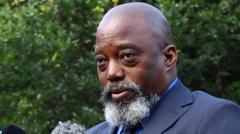Kabila's arrival is seen as a pivotal moment in the ongoing turmoil in the eastern Democratic Republic of Congo, marked by conflict and political accusations.
**Joseph Kabila Returns to DR Congo Amid Controversy and Allegations**

**Joseph Kabila Returns to DR Congo Amid Controversy and Allegations**
Former president's return to Goma sparks reactions from government and rebels following allegations of support for rebel factions.
Former President Joseph Kabila has made his highly anticipated return to the Democratic Republic of Congo (DR Congo) after two years of self-imposed exile, arriving in the rebel-controlled eastern city of Goma. This event comes in the wake of serious allegations from Congolese senators who stripped Kabila of his parliamentary immunity on claims of supporting the M23 rebel group, which has been actively engaged in conflict against the national army.
Kabila, who held the presidency from 2001 to 2019, was reported to have arrived in Goma on a visit confirmed by party officials and rebel spokespersons. Innocent Mirimo, a youth leader from Kabila's People's Party for Reconstruction and Democracy (PPRD), expressed a warm welcome, likening Kabila's return to that of a father reuniting with his children. "Kabila should be allowed full access to the country," Mirimo stated, emphasizing the hope that Kabila would bring solutions to the ongoing crisis.
Despite Kabila's assertion of having no ties to the M23, he has publicly condemned the Congolese justice system, claiming it has been manipulated for political purposes. The former leader has faced severe accusations from the current government, which alleges that substantial evidence links him to the unrest in eastern Congo.
In a now-removed video message, Kabila criticized the sitting government as a dictatorship and voiced concerns over the state of democracy in the region. This comes as tensions between the Congolese army and the M23 have resulted in major advances by the rebel group, coinciding with the displacement of hundreds of thousands of civilians.
Amid this backdrop, Kabila's return has been met with a mixture of hope and skepticism, particularly as Congolese government spokesperson Patrick Muyaya dismissed Kabila's claims, suggesting he has "nothing to offer the country." The political landscape in DR Congo remains fluid as Kabila's presence in Goma could have significant implications for the ongoing conflict and political dynamics.
Kabila, who held the presidency from 2001 to 2019, was reported to have arrived in Goma on a visit confirmed by party officials and rebel spokespersons. Innocent Mirimo, a youth leader from Kabila's People's Party for Reconstruction and Democracy (PPRD), expressed a warm welcome, likening Kabila's return to that of a father reuniting with his children. "Kabila should be allowed full access to the country," Mirimo stated, emphasizing the hope that Kabila would bring solutions to the ongoing crisis.
Despite Kabila's assertion of having no ties to the M23, he has publicly condemned the Congolese justice system, claiming it has been manipulated for political purposes. The former leader has faced severe accusations from the current government, which alleges that substantial evidence links him to the unrest in eastern Congo.
In a now-removed video message, Kabila criticized the sitting government as a dictatorship and voiced concerns over the state of democracy in the region. This comes as tensions between the Congolese army and the M23 have resulted in major advances by the rebel group, coinciding with the displacement of hundreds of thousands of civilians.
Amid this backdrop, Kabila's return has been met with a mixture of hope and skepticism, particularly as Congolese government spokesperson Patrick Muyaya dismissed Kabila's claims, suggesting he has "nothing to offer the country." The political landscape in DR Congo remains fluid as Kabila's presence in Goma could have significant implications for the ongoing conflict and political dynamics.





















